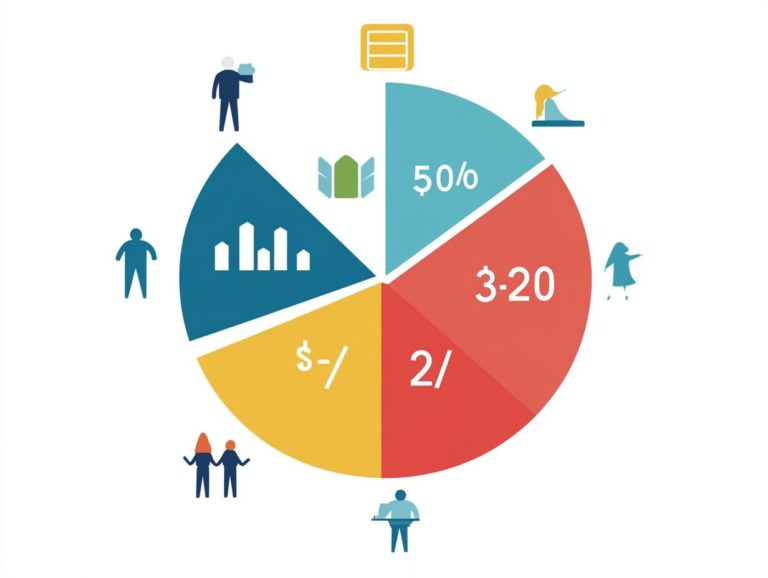What Are the Benefits of Using a Budget?
Budgeting transcends mere expense tracking; it serves as a powerful instrument for attaining financial peace of mind and realizing your long-term aspirations! Start budgeting today to transform your financial future now!
This exploration delves into the essence of a budget and its critical importance for your financial well-being. You’ll uncover the myriad benefits of budgeting, such as enhanced financial control and diminished stress.
Practical steps for creating and maintaining a budget, coupled with tips to optimize its effectiveness, will be laid out for you. Prepare to take command of your financial future!
Contents
- Key Takeaways:
- Understanding Budgeting
- Benefits of Using a Budget
- How to Create and Stick to a Budget
- Additional Ways to Maximize Budgeting Benefits
- Frequently Asked Questions
- What are the benefits of using a budget?
- How can a budget help me save money?
- Can a budget help me reach my financial goals?
- What are some specific financial goals that a budget can help me achieve?
- How does using a budget improve my financial management skills?
- Are there any other benefits of using a budget besides saving and reaching financial goals?
Key Takeaways:

- A budget helps you gain financial control and plan for the future by tracking expenses and setting realistic spending limits.
- Using a budget can lead to reduced stress and improved well-being as you become more aware of your financial habits and make informed decisions.
- Creating a budget requires setting achievable goals and regularly reviewing it, while sticking to it can be aided by using tools and incorporating long-term goals.
Understanding Budgeting
Understanding budgeting is crucial for achieving financial well-being. It encompasses various types, including business budgeting, zero-based budgeting (starting from scratch each budgeting period), and performance-based budgeting (focusing on outcomes). A budget acts as an essential financial document that outlines your expected income and expenses, helping you manage your money better to meet your internal goals.
By grasping the principles of budgeting, you can navigate your personal finances with confidence and assess your resource availability. This structured financial roadmap guides your financial decisions and empowers you to make informed choices that align with your goals.
What is a Budget and Why is it Important?
A budget is your detailed roadmap, outlining expected income and expenditures over a specific period. It serves as your guide for financial allocation and achieving your goals. Mastering this tool is essential for effectively managing your personal finances and can elevate your financial literacy to new heights!
When you maintain a clear budget, you can prioritize essential expenses, pinpoint areas ripe for savings, and allocate funds thoughtfully whether for everyday bills or long-term investments. This practice builds discipline in your spending habits! It helps you make smarter financial decisions regarding your aspirations.
In your daily life, you can harness the power of simple budgeting tips, such as:
- Tracking your daily expenses
- Setting realistic targets
- Reviewing your financial statements regularly
For businesses, a structured budget is invaluable for resource allocation, giving managers the power to make strategic decisions that align with corporate goals. Ultimately, grasping the nuances of budgeting can significantly enhance your financial competence, allowing you to navigate your financial future with confidence and clarity.
Benefits of Using a Budget
Employing a budget presents a wealth of advantages, including heightened financial control, enhanced financial well-being, and a marked reduction in the stress that often accompanies personal finances. Understanding why budgeting is important for everyone can further reinforce these benefits.
By crafting a clear financial roadmap, you can prioritize your spending, allocate resources judiciously, and set achievable financial goals. This strategic approach can profoundly influence your overall quality of life.
Financial Control and Planning

Financial control and planning are essential elements of effective budgeting that empower you to monitor your spending habits and adjust how you spend your money as necessary. By utilizing a budget, you can gain valuable insights into your available resources, allowing you to make informed decisions regarding your finances.
This structured approach supports your personal financial management and is equally vital for businesses aiming for sustainable growth. When businesses establish a comprehensive budget, they can assess their cash flow the money coming in and going out allocate resources more efficiently, and prepare for unexpected expenses. This level of precision enables them to identify areas for potential cuts, ultimately enhancing profitability.
In both your personal and professional life, effective budgeting cultivates discipline and reduces financial stress. It paves the way for achieving long-term goals. Thus, it plays a crucial role in ensuring that your allocated resources align with your priorities, leading to improved financial health and stability.
Reduced Stress and Improved Well-Being
Using a budget effectively not only reduces stress but also enhances your financial well-being, empowering you to take control of your personal finances. By clearly outlining your income and expenses, a budget alleviates the anxiety that often accompanies financial uncertainty.
This structured approach clarifies your spending and highlights opportunities for saving. It enables you to prioritize essential needs over fleeting wants. Implementing actionable budgeting tips like tracking daily expenses, setting aside a specific percentage for savings, and regularly reviewing your financial goals can significantly elevate your peace of mind.
Over time, these strategies cultivate a sense of security and control over your finances, diminishing the fear of unexpected costs and leading to a more relaxed, fulfilling life. Ultimately, embracing budgeting as a lifestyle choice allows you to focus on your broader well-being, liberating you from the burdens of financial worries.
How to Create and Stick to a Budget
Creating and adhering to a budget may seem daunting at first, yet with effective strategies at your disposal, you can adeptly manage your finances and elevate your financial performance.
Begin by clearly outlining your anticipated income and expenses. This foundational step ensures that your spending habits are in harmony with your financial goals and the resources available to you.
Steps for Creating a Budget
Crafting a budget includes essential steps, beginning with a thorough assessment of your projected income and a thoughtful determination of how to allocate funds based on your expenses and savings objectives. By employing a structured approach, you can create a budgeting plan tailored to your unique needs.
- Start by gathering all pertinent financial documents think pay stubs, bank statements, and bills to get a good idea of your current financial landscape.
- Next, compile a detailed list of both fixed and variable expenses, ensuring you capture every monthly obligation, from rent and utilities to groceries.
Once you’ve outlined your expenses, it s time to set realistic financial goals. Decide how much you want to save or allocate for future investments. Consider utilizing budgeting tools or apps to help monitor your spending and make adjustments as needed.
Embrace these budgeting strategies to make managing your finances effortless and fun! You can start simplifying your finances today!
Tips for Sticking to a Budget

Sticking to a budget demands a certain level of discipline and commitment. The rewards are well worth the effort. There are effective strategies at your disposal that can elevate your financial well-being and refine your spending habits. By embracing specific budgeting tips, you can stay on course and sidestep the pitfalls of overspending.
Regularly reviewing your budget is essential. It allows you to spot patterns and make necessary adjustments in response to income fluctuations or unexpected expenses. Consider setting aside a specific time each month to assess your spending habits and redefine your goals as needed.
Utilizing budgeting tools whether apps or spreadsheets can streamline this process. They provide a clear visual representation of where your money flows.
By maintaining consistency in these practices, you cultivate a disciplined approach to your finances. This way, you can achieve your short-term objectives and long-term financial aspirations without unnecessary stress.
Additional Ways to Maximize Budgeting Benefits
Unlocking the full potential of budgeting means doing more than just sticking to a plan. Dive into exciting tools and strategies that elevate your financial game!
Set up an emergency fund and plan for retirement savings. This will help you craft a more robust and well-rounded financial strategy that truly aligns with your goals.
Harness the Power of Budgeting Tools!
Utilizing budgeting tools and resources can significantly elevate your financial literacy. This makes the budgeting process not only manageable but also efficient. You have a wealth of options at your fingertips, from apps and spreadsheets to financial counseling services which help you understand and manage your money better.
These tools offer structured templates for tracking your income and expenses. They also include features like goal setting, spending alerts, and visual reports that enhance your understanding of your finances.
Smartphone applications allow you to monitor your financial activities on the go. This makes it easier than ever to adhere to your budget. Alternatively, customizable spreadsheets can be tailored to your unique needs, providing deeper insights into your spending patterns.
Financial counseling services offer personalized advice and strategies. They equip you with the skills necessary to establish sustainable budgeting habits. By leveraging these resources, you empower yourself to take control of your finances, paving the way for a more secure financial future.
Incorporating Long-Term Goals
Incorporating long-term goals into your budgeting process is crucial for crafting a comprehensive financial roadmap. This roadmap paves the way to financial independence and success.
By setting clear long-term objectives like retirement savings or significant investments you can effectively guide your budgeting decisions.
Recognizing the importance of these goals ensures that your financial practices are proactive rather than merely reactive. Regularly assess your financial priorities and adjust your budget to reflect any changes in your life circumstances, whether it’s a new job or a growing family.
A smart strategy is to allocate a specific percentage of your income towards retirement accounts. This fosters disciplined savings habits. Additionally, creating separate savings categories for future expenses, such as purchasing a home or funding education, brings clarity to your financial planning.
By integrating these elements into your budgeting framework, you keep your focus on your financial aspirations. Ultimately, this paves the way for a secure and fulfilling future.
Frequently Asked Questions

What are the benefits of using a budget?
Using a budget can help you track your spending, save money, and reach your financial goals.
Ready to take control of your finances? Start budgeting now and watch your financial dreams become a reality!
How can a budget help me save money?
A budget shows you where your money goes. It helps you spot areas to cut spending.
Can a budget help me reach my financial goals?
Yes! By setting clear financial goals in your budget, you can plan how to use your money to reach those targets.
What are some specific financial goals that a budget can help me achieve?
Some common goals include paying off debt, saving for a house down payment, building an emergency fund, and saving for retirement.
How does using a budget improve my financial management skills?
A budget makes you more aware of your spending and helps you prioritize expenses. Understanding the benefit of tracking your spending can lead to smarter money decisions.
Are there any other benefits of using a budget besides saving and reaching financial goals?
Absolutely! A budget can significantly lower your financial stress and boost your overall well-being. With a clear view of your finances, you ll feel more in control and confident.






